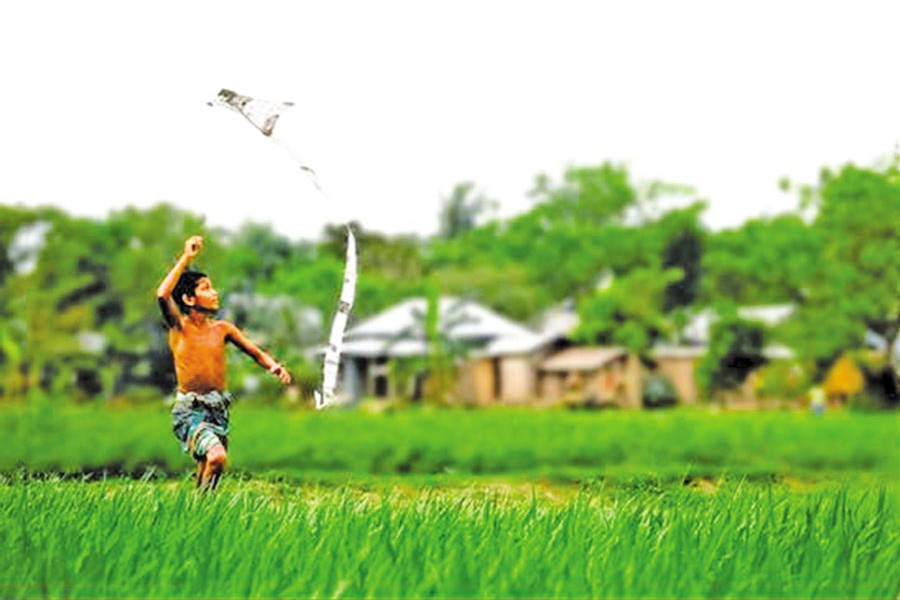
Published :
Updated :

Do we get wood planks from paddy plants? This bizarre question is often cited to give an idea of the knowledge gap of children born and brought up in cities. Why paddy plants? After all, the staple of the Bangalees ---irrespective of their permanent homes in villages or cities ---is rice. So it is expected that a child living in an urban atmosphere at least have the primary knowledge of the plant that feeds the race known for its preference for rice and fish.
Without entering into a debate over whether there are still a few urban aristocrats who take pride in never seeing a paddy field, let's remember how Rabindranath rued the missed opportunity of not stepping out a few paces to see a dew drop on an ear of corns (paddy). Even in fast transforming rural settings, the pristine natural world is disappearing with electric cables, automobiles and even cable TVs, direct to home (DTH) and internet connections announcing their presence. The protruding ugly sights of cell phone towers invaded the picturesque green lines long ago.
People of foresights are often heard to complain that childhood is being robbed of children. Indeed, the dissociation with the worlds of flora and fauna all around is depriving children of the most enriching experience they were supposed to gather in the lap of Nature. In his early years Rabindranath's eyes craved for the limited sights that routinely opened through the window along the narrow lanes leading to a pond. That he moved to Shantiniketan, Bolepur in order to live close to Nature shows the depth of his relations to Nature and Nature's relations to him. During his stay in Shelaidah, the relations received a far-reaching dimension. Wordsworth, another worshipper of Nature roamed across the hills and dales of Yorkshire to enjoy their beauty. To him Nature was an expression of the divine.
Today the landscapes ---both in England and Bangladesh/ West Bengal ---have changed phenomenally, so has children's mental landscape if not even more. However, the young ones are hardly to blame. The kind of education forced on them is largely to blame. They become accustomed, under the system, to turning into the parrot in Rabindranath's Totakahini (Tale of parrot). In most cases they find little leisure to get familiar with birds, flowers, trees, insects and animals. Whatever idea they form of such a living world is from channels such as the Discovery, National Geographic, Animal Planet and BBC Earth, if they at all develop interests in those.
Both home and school environments are, however, not congenial to developing a taste for such soft and humane matters. In urban residents ranging from lower middle class to the affluent, children get introduced either to cartoons or smart phones earlier than they get to see some of the common animals. Schools are more or less professional but passive factories that churn out products for commercial purposes never mindful of the special needs and talents of the young learners. Excepting some rare cases, the human touches from teachers that turn learners' soul into gold are missing.
Text books are substandard and quality of teachers leaves much to be desired. Hardly anyone is interested in life science, geography and anthropology. The focus is on scoring high and achieving GPA (grade point average)-5. Wonder of wonders, when some of the GPA-5 or A+ achievers in this year's SSC examinations were interviewed by a reporter of a TV channel, none of them could even tell what GPA stands for, let alone answer to other common questions.
Will the proposed educational reform and the text books in the making inspire both teachers and students to get closer to the living world, familiar with the sights and sounds of Nature? An academic but Nature lover Dwijen Sharma was one who has made it a point that the natural environment should be left as much unspoiled as possible. Waheedul Huq, known for his multifarious pioneering roles in setting this country's socio-cultural tone, used to get out with a large band of followers to make them familiar with trees. They were natural teachers who are sorely missed by the young generations.
Among the living, Mukit Majumdar Babu has been performing an excellent job by tirelessly focusing on the diversity of Nature. The young generation can learn real life lessons from his programmes, which classroom teaching can hardly offer.
It is indeed dangerous to produce robotic youngsters who are incapable of showing empathy for various forms of life and appreciating beauty in Nature. Education can be really interesting and enjoyable if a balance is struck between the knowledge of science/technology and the precept of the living world.


 For all latest news, follow The Financial Express Google News channel.
For all latest news, follow The Financial Express Google News channel.